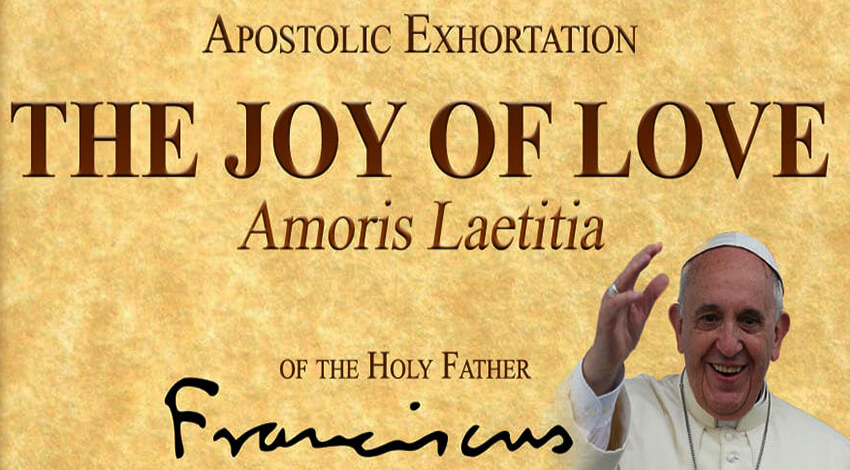
PASTORAL LETTER
ON THE APOSTOLIC EXHORTATION
“AMORIS LAETITIA” (ON LOVE IN THE FAMILY) ISSUED BY THE GHANA CATHOLIC BISHOPS’ CONFERENCE
Greetings
Dear Brothers and Sisters in Christ and all men and women of goodwill who live in our homeland Ghana, we, the Catholic Bishops of Ghana, bring you warm greetings. May the grace and peace of God the ‘Father from whom every family in heaven and on earth receives its true name,’ be with you (Ephesians 3:15).
Gratitude
The Lord God has been gracious to us and to our nation Ghana and her citizens. Last year, we had a very peaceful transfer of power from one political administration to another following successful and peaceful elections in December 2017. Within the same year, we also celebrated with joy and gratitude to God our nation’s 60th Independence Anniversary, and this year, we are blessed once again as we celebrate the gift of a new year after our Diamond Jubilee. For these and many other blessings, we join all Ghanaians, home and abroad, and all peoples who reside in our land, to thank God for how far He has brought us. We pray that God will continue to look with a serene and kindly countenance on us and continue to bless us with His peace even as we join hands in working together to build our nation in the years ahead.
The Joy of the Family is Our Theme
In 2014 and 2015, our Holy Father Pope Francis, convoked two Synods on the Family in Rome to bring the Church together to reflect anew on the vocation and mission of the family. In the light of the challenges that the present-day family faces, the Synods on the Family discussed new and fresh pathways and made recommendations on how the Church can best assist today’s family to overcome the challenges it faces so that the family can continue to play its God-given role as the basic unit of Church and society.
On 19th March, 2016, following the end of the deliberations of these Synods, the Holy Father issued a post-Synodal Apostolic Exhortation, under the title, Amoris Laetitia (the Latin for ‘The Joy of Love’). Containing the fruits of the discussions that went into the two Synods, Amoris Laetitia was intended to be used by both the Universal Church as well as Particular Churches as an important guide on the mission and vocation of the family in today’s world. In presenting Amoris Laetitia to the Church and the world, Pope Francis considered the diverse socio-cultural contexts of the global Church and emphasized the need to incarnate and inculturate the document. He states: “Not all discussions of doctrinal, moral or pastoral issues need to be settled by interventions of the Magisterium (the teaching office of the Church). For some questions, each country or region can seek solutions better suited to their culture and sensitive to their traditions and local needs” (Amoris Laetitia, 3). In this way, the Holy Father’s emphasis on the need to contextualize Amoris Laetitia is apparent and without doubt.
We, the Catholic Bishops of Ghana, are not only grateful to the Pope for his post-Synodal Exhortation but we are also grateful to him for his invitation to apply the document in a way that suits our local context as Church-family of God in Ghana. In the light of this understanding and having studied carefully the rich contents of this recent Church document on the Family, we wish to share with our Priests, Religious Brothers and Sisters, and with all Christ’s lay faithful and indeed, all people of goodwill, the joy of the family in this Pastoral Letter.
In issuing this Pastoral Letter, we are not only affirming the hope we have in the ability of the family to live up to its divine role amidst the numerous challenges it faces today, but we are also assuring all families in Ghana that they remain always in our prayers and can count on us and on our priests and other pastoral agents for the needed support and encouragement.
Amoris Laetitia in the Light of the Church’s Teaching on Family and Marriage
The post-Synodal Exhortation, Amoris Laetitia, is but one more addition to the Church’s rich patrimony of documents on Family and Marriage Life. Previous Church documents on the Family such as the Second Vatican Council’s Pastoral Constitution, Gaudium et Spes, Pope Paul VI’s Humanae Vitae (On The Regulation of Births) and Pope St. John Paul
II’s Familiaris Consortio (On the Role of the Christian Family in the Modern World), have all dealt with the vocation of the family according to the Gospel and as affirmed by the Church over time. Amoris Laetitia not only quotes extensively from these documents, but more importantly, upholds, reiterates and re-presents their perennial and unchanging teaching on the family based on the nature of man, but especially on Sacred Scripture and
Sacred Tradition. Faithfully following the Church’s traditional teachings on the Family and in conformity with these earlier Church documents, Amoris Laetitia emphasizes that:
- a) The family is the icon of God, when teaching that, “The triune God is Himself a communion of love and the family is its living reflection … for He has within Himself fatherhood, sonship and the essence of the family, which is l That love in divine family is the Holy Spirit” (Amoris Laetitia, 11). By stressing the family as the icon of God, the document at the same time invites all of us to recognize that everything that impedes the family from playing its role as this icon ought to be addressed appropriately.
- b) God ordained marriage to be between man and woman. The document teaches that when God made man and woman and blessed them, He (God) intended marriage to be an exclusive union of man and woman (Amoris Laetitia, 9). “Therefore, a man shall leave his father and mother and cleave to his wife, and they shall become one flesh” to buttress this point (Genesis 2:24).
- c) God intended marriage to be open to life, when “He blessed them and said increase
and multiply” (Gen. 1:27-28).
- d) God determined marriage to be indissoluble as Jesus affirms: “What therefore God has put together let no man put asunder” (Mat 19:6).
With these teachings on Marriage and Family, Amoris Laetitia reaffirms the importance of marriage and family life, and reiterates the Catholic Church’s unchanging doctrine that marriage must be between man and woman, must be open to life, must be faithful and must be ordained to the good of the spouses as well as the procreation and the education of offspring. In these teachings then, we see that Amoris Laetitia bears great testimony to all the previous teachings of the Church concerning family and marriage life, a long, consistent tradition that cannot be overemphasised.
Applying Amoris Laetitia to the Concrete Context of the Ghanaian Family
Everywhere in the world today, the family is undergoing significant challenges, challenges which continue to rock the very foundation upon which Church and society are built. The Ghanaian family is not exempt from these challenges. As elsewhere, family life in Ghana today continues to face many crises, including the following:
- a) Philosophy of Relativism – The emergence of new philosophies that seek to redefine marriage as a free union between two people who are attracted to each other, whether they are of the same sex or not. This situation threatens to cloud the true meaning of marriage;
- b) Infidelity of Couples – The development and maintenance of sexual relations with other people outside of lawfully constituted marriages continue to afflict many marriages and families with potential break-ups and divorce;
- c) Domestic Violence – The situation in which both married men and women suffer violence and abuse by their spouses continues to occur in many marriages, often leading to fear, oppression, alcoholism, amorous relationships, escapism and refuge in work, injuries, and even sometimes, death;
- d) Cohabitation/Concubinage – Some people continue to cohabit for long periods of time without any concrete plans of going ahead to regularize their marriages;
- e) Divorced and Remarried Catholics – The situation where lawfully married couples are forced by circumstances to divorce from living and lawful spouses to marry civilly, which subsequently leads to their non-admission to the Eucharist, causing pain and suffering to the whole Church; and
- f) Childlessness – When marriage has been for some time without children, and undue pressure is brought to bear on the couples, but especially the women.
These are some of the challenges facing the family in Ghana as elsewhere, but we are not oblivious to the fact that there are many others besides such as migration of spouses, lack of housing, the threat posed by pornography, the abuse of minors and housemaids, lack of respect and attention to the aged and neglect of the disabled, the growing culture of death which promotes abortion, masturbation and homosexuality, among others. All these continue to plague the Ghanaian family.
In the face of these many challenges, we, your Pastors wish to assure you that God does not abandon His people in their difficulties and His Church on earth will not abandon you. The Church in Ghana will continue to accompany all families, especially wounded and distressed ones, to help them not to despair but to trust in God whose Son, Jesus Christ, heals all our wounds (cf. Isa. 53:7).
Some Pastoral Recommendations
Against the background of the numerous challenges facing the Ghanaian family today and the urgent need for the Church in Ghana to help all families to deal with these challenges, we wish to offer the following recommendations as relevant guidelines of the Church in Ghana on Family and Marriage Life:
- a) Evangelization of families: Evangelization first takes place in the family where parents by word and example become the first heralds of the truth to their children (Lumen Gentium, 11). Amoris Laetitia also recommends that families should not only be evangelized, but they should also evangelize (Amoris Laetitia, 200). The
Church in Ghana assures all families that she will continue to assist parents to play their role as first evangelizers through effective pre-marriage, proximate and post- marriage formation programmes.
- b) A Structured National Marriage Programme: It has become urgent for us to repeat the call we have been making all this while about the need for the Church in Ghana to have a well-structured and sustained national catechetical programme for the on- going formation of all prospective and married We repeat our call to the National Catechetical Commission to lead the efforts in this direction.
- c) Annual Celebration of Family Week: The proposal to celebrate Family Week annually remains important to us, if not more urgent today. In this vein, we encourage all Dioceses, Parishes and Rectorates to give the needed attention to this programme and plan to celebrate it annually in a fitting
- d) Pastoral Formation on Marriage and Family Life: In acknowledging that ordained ministers and other pastoral agents often lack the training needed to deal with the complex problems the family faces today, we urge that formation in seminaries, novitiates and other houses of formation should help deepen their candidates’ knowledge in marriage and family matters while priests and religious should endeavour to update their knowledge on family and marriage issues through periodic on-going formation progra
- e) Ministry to Childless Couples: Marriages of spouses to whom God has not granted children present a challenge but they also radiate a fruitfulness of charity, hospitality and sacrifice. The Church in Ghana has a divine duty to minister to such couples, who must be encouraged to accept Amoris Laetitia’s broad understanding of family lif This includes “expanded fruitfulness” which appreciates and welcomes adoption as a good Christian way of welcoming new members into the family and promoting a culture of encounter with all (Amoris Laetitia, 178-179).
- f) Ministry to Divorced and Remarried Couples: Although the Church in Ghana does not intend to admit divorced and remarried couples to the Eucharist without first having had the opportunity for examining individual cases for pastoral and canonical remedy, she will not abandon Catholics who find themselves in this situation. She will continue to help them to understand that they are full members of the Church and very much part of the flock of Christ, the Good S The Church will continue to journey with them in a careful process of prayer and discernment to see the possibilities for rectifying such situations. Diocesan and inter-diocesan tribunals should be resourced and strengthened to deal adequately with these situations.
These recommendations are offered as general guidelines to help the Church in Ghana to make Marriage and Family Life issues one of the topmost priorities. We expect all our Parishes and Rectorates to adopt and use them as guideposts in their marriage formation programmes, and all Dioceses to help the National Catechetical Commission to develop a fuller and more comprehensive document on Marriage and Family Life for the use of the whole Church in Ghana.
Conclusion
Finally, the joy of the family is the joy of the Church and of the society as a whole. In the words of Pope Francis, all of us are called to keep striving towards something greater than ourselves and our families, and every family must feel this constant impulse. The work of building the family as an oasis of joy is a work that is entrusted to the entire Church to do. Both Church and society need to build strong families that can withstand the challenges that today’s globalized world presents to the family. Counting on the support and collaboration of all of you, Christ’s faithful, Priests and Religious Brothers and Sisters and the laity in Ghana, we hope to journey together to build our families to stay strong and faithful to their mission and vocation in the very complex and challenging world of today. We recommend that Catholics in Ghana, particularly Catholic families, would study and familiarize themselves with the contents of Amoris Laetitia, and live it.
May the Holy Family of Jesus, Mary and Joseph, in whom we contemplate the splendour of true love, grant that our families may be places of communion and prayer and authentic schools of the Gospel and small domestic churches. May Jesus, Mary and Joseph, graciously hear our prayer. May God bless us and grant us His peace. Amen.
Given on this Friday, June 29, 2018 (Solemnity of Ss. Peter and Paul)
from the National Catholic Secretariat, Accra

